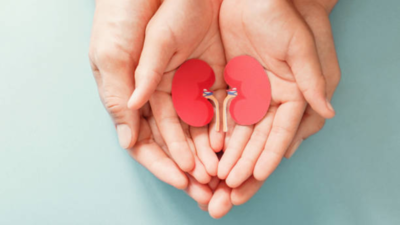Kidney Health: Can gaining even 3-4 kgs of weight increase our risk of kidney disease? How to prevent it |

Sometimes, the weighing scale doesn’t scream trouble. A few extra kilos, say 3 or 4, might not seem like much. They might even feel like a normal part of festive indulgence or lifestyle changes. But there’s a side to this small weight gain that doesn’t get talked about enough. The kidneys, those silent, hardworking organs, often bear the hidden brunt.Studies have pointed to a surprising link between even mild weight gain and the risk of kidney-related problems. It’s not just obesity that puts pressure on these organs, but even a few extra kilos can trigger imbalances that quietly affect kidney health.
The weight-kidney connection
It’s often believed that only significant obesity impacts kidney health. But that’s not entirely true. According to a study even modest weight gain over a short period was linked with early signs of kidney damage, especially in people who were otherwise healthy.
Poll
Do you believe that even a small weight gain can impact kidney health?
Here’s what happens: the kidneys work to filter waste and maintain fluid balance. But with more body weight, even if it’s just a few kilos, the kidneys are forced to filter more blood than usual. This overwork, medically known as hyperfiltration, may sound efficient—but over time, it strains the kidneys and may lead to reduced function.

Inflammation and insulin resistance
Gaining even a little weight, especially belly fat, isn’t just about numbers. Extra fat tissue, especially visceral fat (fat around the organs), can trigger chronic low-grade inflammation. That inflammation doesn’t just sta
y local; it circulates through the body, subtly disturbing blood vessels and kidney tissue.Also, minor weight gain can disrupt insulin sensitivity. And when insulin doesn’t work effectively, it can affect how sodium is retained in the body, raise blood pressure, and alter kidney filtration—all of which are risky for long-term kidney function.This isn’t something visible in a mirror. But inside the body, subtle biological chaos may already be underway.
The myth of “healthy weight gain”
There’s often talk around “healthy” weight gain, especially among those who are underweight or athletic. While muscle gain is beneficial, not all weight gain is equal. It becomes tricky when fat gain is mistaken as harmless, especially in the absence of visible obesity.Even in those with a normal Body Mass Index (BMI), gaining just a few kilos of fat, particularly in the abdomen, has been shown to increase urinary albumin—a protein that, when leaked into urine, may indicate kidney stress. So, looking ‘normal’ isn’t always a free pass for kidney safety.

Chronic kidney disease (CKD) affects millions worldwide. It is a long-term condition where the kidneys do not work as well as they are supposed to. Though it is a common condition, many people don’t even know they have it.
Small preventive habits that actually matter
Preventing kidney strain doesn’t require a major lifestyle overhaul. A few intentional changes can make a real difference:Morning hydration with a pinch of lemon: This helps kidneys flush out toxins naturally and keeps the internal filter system light and clean. It’s gentle but powerful.30 minutes of movement before breakfast: Be it a walk or gentle stretches, moving before the day begins can activate metabolism and reduce visceral fat accumulation.Swap dinner plates with smaller bowls: This simple trick often leads to consuming 15-20% fewer calories daily without even noticing. Less calorie surplus, less fat accumulation.Mindful salt awareness: Excess sodium silently stresses the kidneys. Instead of focusing only on table salt, keeping an eye on hidden sources—like packaged foods or pickles—can reduce sodium load.
Getting regular kidney checkups
The truth about kidney disease is that it rarely shows symptoms in the early stages. That’s why it often goes unnoticed until significant damage is done. Especially after any unintentional weight gain, it’s wise to check kidney function through a simple urine test (albumin levels) and blood test (creatinine levels).These small tests often reveal what the body isn’t saying. And catching early imbalances gives a real chance at reversing or controlling them before they escalate.





